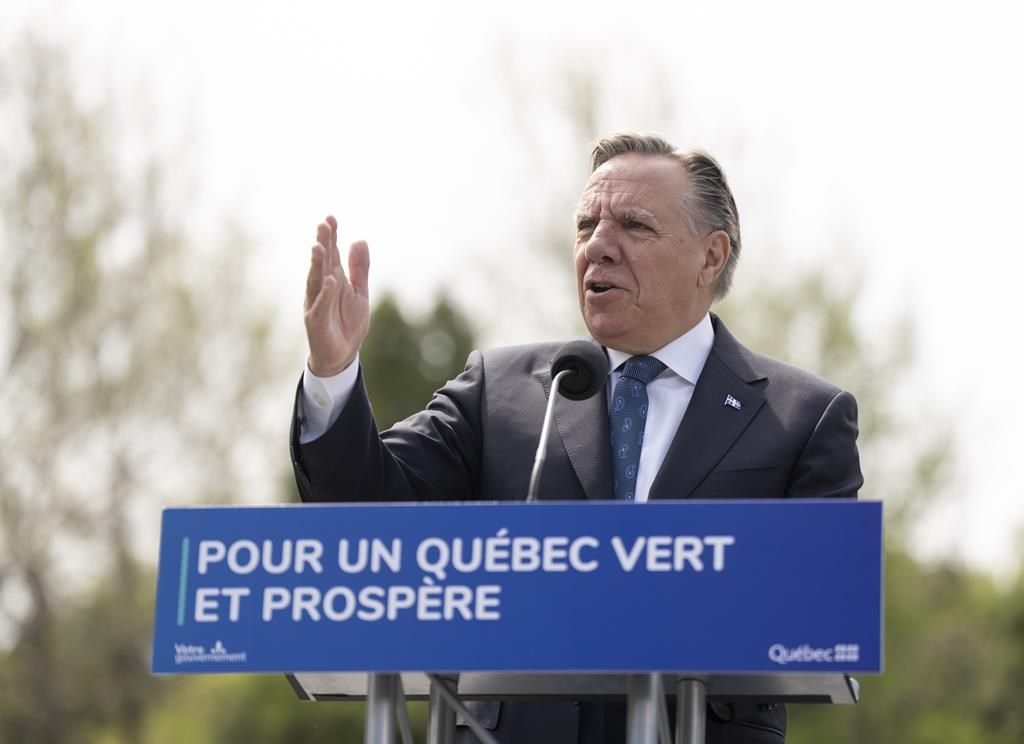Support strong Canadian climate journalism for 2025
MONTREAL — The Quebec government has now mapped out how it will achieve 60 per cent of its greenhouse gas emission reduction targets, Premier François Legault said Friday as he announced an updated green economy plan.
The third edition of the province's green plan details increased funding for greenhouse gas reduction and climate change adaptation first announced in the March provincial budget. The province this year added $1.4 billion for the plan, bringing the total to $9 billion over five years.
Legault said Quebec already has the lowest emissions per capita in North America and he wants that to be remain true in 2030
"We are really a leader, and with the plan that was tabled today, we should still be the first," he told reporters in Montreal.
The province is aiming to reduce greenhouse gas emissions to 37.5 per cent below 1990 levels — a reduction to six tonnes of carbon dioxide per resident from nine. The plan focuses on the transport and manufacturing sectors, which account for 40 per cent of emissions in the province.
Among the measures in the plan are more than $500 million to support the construction of charging stations for electric vehicles, as the government looks to bring the number of electric vehicles on Quebec roads to two million.
The plan also includes $1 billion to reduce the carbon footprint of buildings, which are responsible for almost 10 per cent of the province's greenhouse gas emissions. About $215 million of that money will help fund projects for thermal waste treatment — methods that transform waste into energy that can be used for such things as heating.
Legault said the government plans to create a rating system to assess the energy performance of large buildings.
Patrick Bonin, a climate and energy campaigner at Greenpeace Canada, said Quebec is coasting on the fact that most of its electricity comes from renewable sources and argued the plan doesn't go far enough. He said he'd like to see more regulations, instead of billions of dollars in incentives.
"It's a lot of carrots and no sticks," he told reporters Friday.
The previous version of the plan included measures aimed at getting halfway to the province's reduction target. Legault said he is counting on technological advances to help the province hit 100 per cent of its goal by 2030.
While Bonin said the plan includes some good elements, such as the funding in electric vehicle charging stations, he said, it isn't credible when it counts on future technologies to achieve 40 per cent of its emission reduction targets.
"Quebec is not on track to reach and respect its greenhouse gas reduction target by 2030, and that is quite a concern," he said.
This report by The Canadian Press was first published May 19, 2023.





Comments
"Carrots not sticks" is practically the Biden IRA motto. I'm content with it as a first step; getting buy-in is really hard, and I still can't believe they sold the carbon tax with those rebates, solid as the arithmetic is.
I made a half-joke to my bosses when Calgary was contemplating the transition from waste-allowing flat-rate water, to water meters, about 1995. I said in a meeting that we have to use a lot of incentives and sales pitches until they go from 60% majority to 40% minority - THEN we can start demonizing them as wasters and greedheads.
It got a laugh, but the Manager nodded thoughtfully. We never did demonize anybody, but our rhetoric did shift after the metered were a clear majority, only then did we start asking for a year by which it would be mandated, and for "no new flat-rate accounts".